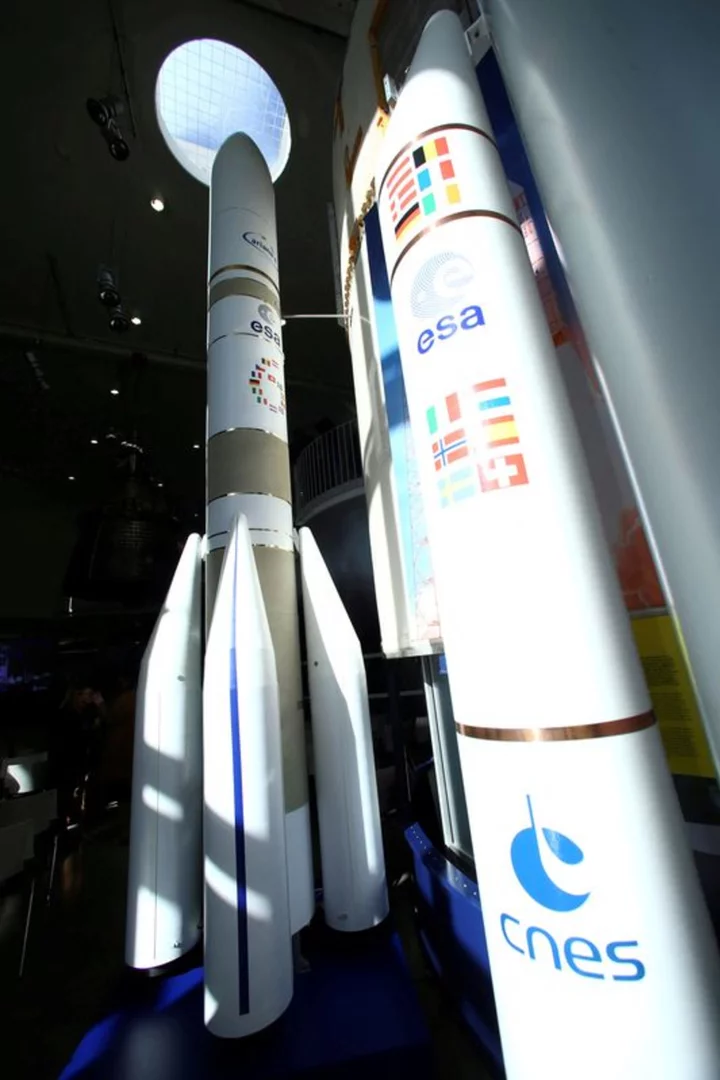(Moves expert quote from paragraph 7 to 15 to show he was referring to exploration project)
By Tim Hepher and Giuseppe Fonte
(Reuters) -Europe on Monday challenged the private sector to develop services for small rockets that could guide future space reform, while stabilising finances for troubled medium and heavyweight launchers for the coming decade.
The head of the European Space Agency (ESA) said the decision to foster competition had long-term implications for the industry, which is wrestling with a short-term gap in space access due to delays and technical setbacks with Ariane 6 and Vega-C rockets.
"We are in the midst of a paradigm shift for space transportation," Director General Josef Aschbacher said halfway through two days of space talks in Seville, Spain.
The announcement marks a new departure for the 22-nation agency which has previously designed and procured launchers and wants to move towards a leaner system of buying services to help Europe mimic the runaway growth of rivals like Elon Musk's SpaceX.
"The launcher challenge...will lower the cost of public funding and stimulate a new market for European space entrepreneurs," Aschbacher told ministers.
Such projects would start with a new generation of mini-launchers but could set the tone for longer-term replacements for Europe's heavier Ariane 6 and Vega-C, which remain Europe's only independent options for major payloads in coming years.
The move is part of a broader deal easing months of tensions after France lobbied for more support for Ariane 6, Germany pressed for competition in the France-led launch sector and Italy demanded a bigger say on its domestically produced Vega-C.
LAUNCHER DEAL
In a side declaration, France, Germany and Italy took credit for breaking deadlock and forging an agreement backed by other ESA nations, though delegates said all 22 nations had a role.
"We have a stable future for heavy and medium-sized launchers. This is a big relief because a few days ago we did not have this situation yet," Aschbacher told reporters.
The deal means countries involved in existing launchers will provide up to 340 million euros ($364.48 million) of annual support for Ariane 6 and 21 million euros for Vega-C from 2026, to help close a gap between rising costs and market prices.
They also guaranteed four institutional launches a year for Ariane 6 and three for Vega-C.
The agreement secures a second batch of Ariane 6 launches from flights 16 to 42 after previous commitments covered an inaugural test flight and 14 commercial launches. That will give Airbus and other contractors more confidence to order parts.
In return, the industry will have to cut costs by 11%, French Finance Minister Bruno Le Maire told reporters. Ariane 6 is built by Airbus-Safran venture ArianeGroup.
Italy said earlier the deal could also lead to Vega-C being operated by Italian manufacturer Avio in addition to Arianespace, which is currently the sole European operator.
Ministers also agreed to breathe new life into exploration by inviting private funding for a potential space plane to ferry cargo to and from the International Space Station.
"It's a mini-revolution because what they want to do now is buy a service," said Antoine Meunier, author of a recent book on the "long road" to European crewed space flight.
However the new initiative, backed by 75 million euros of public seed funding, fell short of recent calls by experts including former NATO Secretary General Anders Fogh Rasmussen for a radical European plan to catch up with dominant space powers like the U.S., Russia, China and increasingly India.
Aschbacher, who has warned Europe against falling behind on space as it did on IT, described the plane as a "first step" and said it could be eventually be adapted to include human flight.
Until now, Europe has carved out a leading role in climate and scientific observation but rarely targeted a prime role in human exploration - opting instead for a junior role in projects led by U.S. space agency NASA or until recently Russia.
The proposal echoes the Hermes space plane, which never got off the drawing board. Europe's answer to the U.S. Space Shuttle was designed to carry three astronauts but was scrapped in 1992.
($1 = 0.9328 euros)
(Reporting by Tim Hepher, Giuseppe Fonte, Charlotte Van Campenhout; editing by Robert Birsel, Barbara Lewis, Josie Kao and Rod Nickel)

